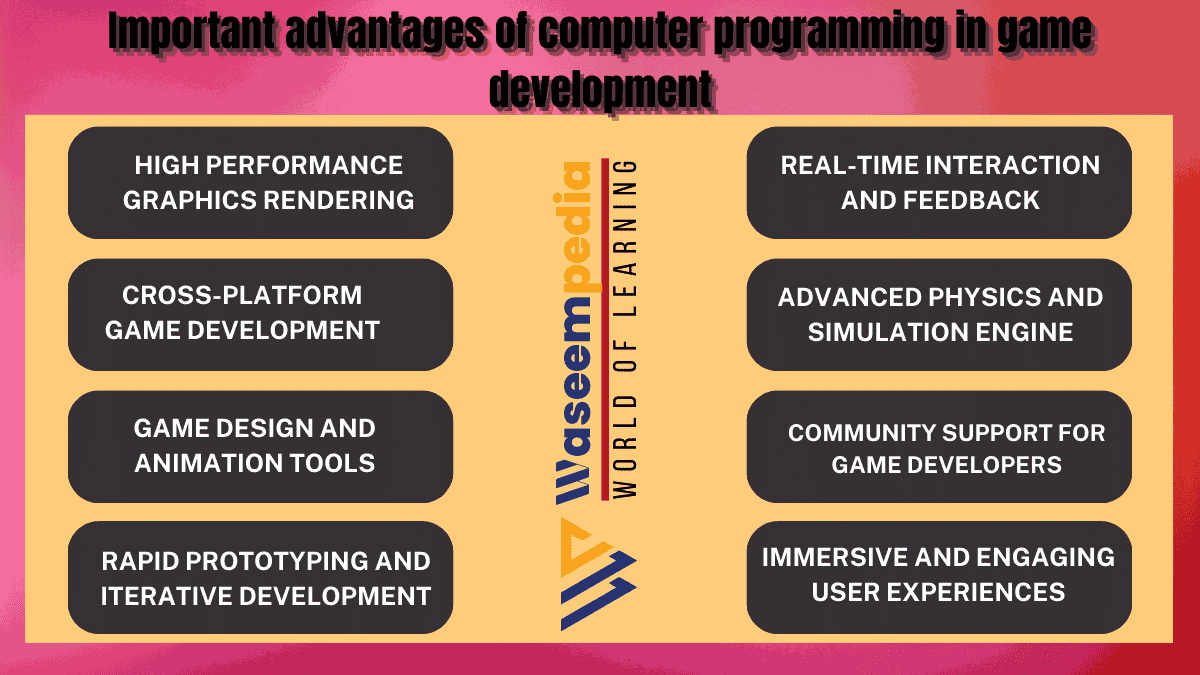The important advantages of computer programming in game development are vast and multifaceted. From coding the fundamental game logic to creating stunning visuals, implementing AI, and ensuring cross-platform compatibility, programming is the driving force behind the gaming industry’s innovation. As technology advances, skilled programmers will continue to shape the future of gaming, delivering increasingly immersive and engaging experiences for players worldwide.
Game development is a dynamic and creative field where computer programming plays a pivotal role in bringing virtual worlds to life. This article explores the crucial advantages that computer programming brings to the realm of game development, shaping immersive and interactive gaming experiences.
What is Game Development
In the intricate world of game development, computer programming is the backbone that transforms creative visions into playable realities. This article delves into the essential advantages that programming contributes to the process of crafting engaging and entertaining games.
7 Advantages of Computer Programming in Game Development
1. Foundational Skills Development
one of the primary advantages of computer programming in game development is foundationof skill. that is clearly discussed here:
Coding the Framework for Game Logic
Computer programming is the bedrock for establishing the framework of game logic. Programmers create the code that defines how the game responds to user inputs, processes events, and manages various gameplay mechanics. This foundational skill is essential for crafting the interactive elements that define a game.
Efficient Data Management
Efficient data management is critical in game development. Programming allows developers to manage large volumes of data, from character attributes to environmental details, ensuring smooth gameplay and a seamless user experience.
2.Graphics and Visual Effects
one of the secondary advantages of computer programming in game development is is graphics and virtual effects that is defined here:
Rendering Realistic Graphics
Computer programming empowers game developers to create realistic graphics by implementing rendering algorithms. From lighting effects to intricate details, programming is instrumental in achieving visually stunning graphics that enhance the overall gaming experience.
Implementing Visual Effects and Animations
Programmers implement visual effects and animations to breathe life into game environments. Whether it’s simulating realistic physics or creating dynamic character movements, programming enables developers to deliver visually captivating and immersive gaming experiences.
3. Game Physics and Simulation
Realistic Game Physics
Game physics, responsible for simulating realistic movements and interactions, relies heavily on computer programming. Programmers develop algorithms that govern how objects behave within the game world, contributing to the authenticity of in-game physics.
Simulating Complex Interactions
Programming allows for the simulation of complex interactions within the game environment. From simulating weather conditions to modeling intricate ecosystems, developers use programming to create dynamic and responsive game worlds.
4. Artificial Intelligence (AI) in Games
Implementing AI Behaviors
Artificial Intelligence proved very benifical in Games. Computer programming is integral to implementing artificial intelligence (AI) behaviors in non-player characters (NPCs) and opponents. This ensures that in-game entities exhibit intelligent responses, creating challenging and dynamic gameplay scenarios.
Adaptive AI for Enhanced Gameplay
Programming adaptive AI systems enhances the gaming experience. AI-driven opponents can learn and adapt to a player’s strategies, providing a level of challenge that evolves throughout the game, keeping players engaged and immersed.
5. Multiplayer and Networking Capabilities
Networking Infrastructure
Computer programming is essential for creating the networking infrastructure that enables multiplayer gameplay. Programmers develop code to manage player connections, synchronize game states, and facilitate seamless interactions in multiplayer environments.
Real-Time Communication
Programming enables real-time communication between players in online games. From voice chat to in-game messaging, the networking code ensures that players can interact and collaborate in a shared virtual space.
6. Cross-Platform Compatibility
Code Optimization for Cross-Platform Compatibility
Programming plays a crucial role in optimizing code for cross-platform compatibility. Skilled programmers ensure that games run smoothly on various devices, from gaming consoles to PCs and mobile devices, providing a broader reach for the gaming community.
Unified User Experience Across Platforms
Efficient programming contributes to a unified user experience across different platforms. Whether playing on a console or a smartphone, gamers expect consistent gameplay, and programming ensures a seamless transition between devices.
7. Iterative Development and Debugging
Iterative Development Process
Programming supports an iterative development process in game development. Programmers can quickly implement, test, and refine features, allowing for agile development and the incorporation of player feedback to enhance the gaming experience.
Effective Debugging for Bug-Free Games
Debugging is a critical aspect of game development, and programming skills are essential for identifying and fixing bugs. The ability to troubleshoot and debug code ensures that games are released with minimal technical issues, providing players with a smooth gaming experience.

